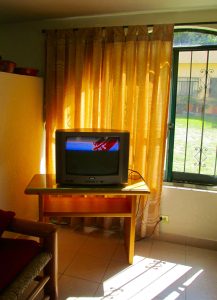Cable TV is included in the rent here in my new lily pad near el centro in San Miguel de Allende, Mexico. So when I’m home – and not out and about in this beautiful, sunny, and lively colonial town – I often turn on the TV, whether I sit in front of it and watch or not, to see what it has to offer me. And what it offers me is the world.

I had cable in my condo in Taos, too, but it wasn’t like this.
There was no EuroChannel, for example, taking me into the dark and stormy streets of Paris and its surrounds, where pipe-smoking Inspector Maigret and his team ably solve murder mysteries nearly every night.
This long-running series’ language is French, of course, so when I watch it here I scramble to understand what everyone is saying in the second language I once struggled (unsuccessfully) to master, then I quickly read the Spanish subtitles to maybe — just maybe — learn a new word or two in the language I’m attempting to learn here and now. As I do so, I tell myself I’m evading Alzheimer’s.
I’m told that many people have learned Spanish by watching TV – specifically, Telenovelas; but these sorts of programs don’t interest me. I doubt that I’ll ever need the vocabulary necessary to keep up my end of a hot fight with an errant lover, which appears to be the main activity on these Latin soap operas.
But other Mexican programs in Spanish are instructive and practical for me, I’ve found. One in particular is a cooking show called “Mexico de Mil Sabores” (Mexico of a Thousand Flavors), featuring a young (and handsome and able) chef named Jesus Gibaja, who travels all over this vast and fascinating country demonstrating the traditional cooking methods of each region. Jesus’s Spanish is clear and simple. I’ve learned a lot from watching and listening to him. (“Ahora, un poco mas de sal,” he says, as he plops a handful of salt into a big pot.)
All together, over one hundred channels are offered on this cable TV network – with the usual range from cartoons for kids, pop music for teens, and sports for guys, to ballet and opera and university lectures – all in Spanish. There are American movies and shows, such as my favorite program, “Law & Order,” dubbed in Spanish. There are travel shows that have recently taken me to a quaint little village in Siberia and, on another day, to Tokyo. (Who knew that the skyscrapers in Tokyo look so much like Manhattan’s?) In Tokyo I also saw the inside of the travel guide’s miniscule apartment, which made my little lily pad here in San Miguel seem palatial by comparison.
There are programs in English, too, of course; and I confess I turn to them when my new-language-challenged brain needs a break. CNN and the BBC are my go-to networks when I need to know the news. But what news!
One afternoon last week I tried to make a game of it: I changed from one channel to the other – and then back again, in quick succession — to compare what each had to offer their respective audiences. This is how it went:
BBC: The nuclear blast out of North Korea…
(click)
CNN: Donald Trump (blah…blah…blah…)
(click)
BBC: The Paralympics in Rio…
(click)
CNN: Trump (la…la…la…)
(click)
BBC: The Hajj in Saudi Arabia…
(click)
CNN: Trump (rah…rah…rah…)
(click)
BBC: The weather in Panama.
I came away from this game wondering whether America’s worldview has, thanks to this bizarre and overly long election “season,” shrunk to the size of one scary orange blob.
The expats I’ve met so far here in SMA are paying attention to this election and do try their best to follow the news, as harrowing as it’s appearing to be. My friends in New York, on the other hand, whom I visited just a few weeks ago, don’t seem to watch TV nor talk about the election at all. Maybe they’ve stopped changing channels completely. My guess is that to save their sanity they’ve even pulled the TV’s plug.
